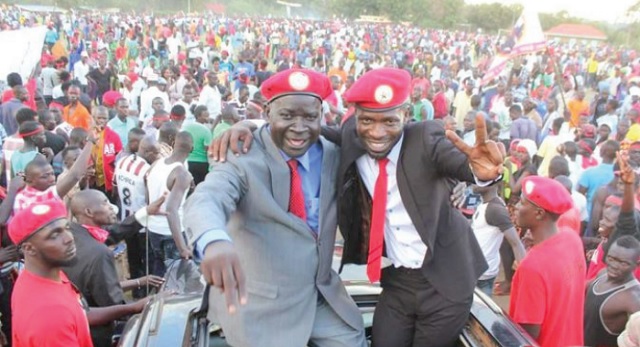
NRM, FDC battled eight by-elections but a young untested legislator became the issue
Kampala, Uganda | IAN KATUSIIME | This year, 2018, saw some upsets and changes in the political lay of the land as 36-year-old legislator Robert Kyagulanyi popularly known as Bobi Wine continued to exert his presence on a scene dominated by personalities who took part in a guerilla war more than thirty years ago.
Having won a landslide victory in a by-election in Kyadondo East in 2017, Kyagulanyi an Independent MP, proved vital for the opposition as they won a number of similar elections where he stumped for candidates against the ruling party.
For President Yoweri Museveni, Kyagulanyi has been a unique opponent not least his age and the part of Uganda he comes from. Never one to underestimate threats, Museveni threw Kyagulanyi in jail on a treason charge that observers say is more politically trumped up than that pressed against Dr Kizza Besigye upon his return from exile in 2005.
Museveni’s longtime rival Dr Besigye also saw significant changes in the party he has always led during election time as its position as the voice of opposition was challenged by the so-called “people power” of Bobi Wine. It was ironic because Kyagulanyi was initially seen as a protégé of Besigye. The new leaders of FDC started their term with the cloud of imminent break away by their predecessor Maj. Gen. (Rtd) Mugisha Muntu. That would end years of internal bickering but open new challenges.
As Besigye watched FDC wrangles from a distance with his protégé Patrick Amuriat as party president, Kyagulanyi took up Besigye’s place and became the opposition’s poster child for everything anti-government. He led city protests against new taxes on mobile money and social media and spoke out on a range of critical national issues.
The ruling National Resistance Movement (NRM) party that had started the year on a high; reveling in a constitutional amendment granting its chairman Museveni carte blanche to contest for the presidency, but it suffered as its Electoral Chairman Tanga Odoi openly castigated Secretary General Justin Kasule Lumumba as a “good dancer and a poor administrator”. It was bad blood flowing from the 2015 violent party primaries.
More turmoil beset the party when nearly 400 staff were laid off in February due to a shortage of funds and as it moved to discipline 28 of its MPs who voted against the party positions in parliament. It also watched in dismay as a determined Kyagulanyi led a wave of popular reactions against the move.
Through his musical influence and youthful appeal, Kyagulanyi was conspicuous at elections held in Jinja Municipality East, Rukungiri, Bugiri and Arua and his bearing on the outcome of those elections cannot be overstated. While at rallies, Kyagulanyi spoke often on the futility of fighting Museveni along political party lines. He preached and often got united fronts by the opposition.
His arrest in Arua in August and alleged torture at the hands of soldiers of Special Forces Command (SFC) was a rite of passage for him as an opposition politician and led to an outpouring of emotion and international sympathy for the self-acclaimed-ghetto president .
Museveni took to writing public missives against Kyagulanyi in the media and in one of them accused him of forming rogue groups to cause chaos under the cover of elections. The President said, as a result “so many women and children were similarly attacked in Jinja East, Bugiri municipality and, now, Arua municipality”. The three are places where Kyagulanyi was heavily involved and where NRM lost.
Nicholas Opiyo, a lawyer and political commentator, says Bobi Wine and People Power dominated the year because the two have been in the pipeline consciously and unconsciously. “Bobi’s musical career has been about social good, and the forgotten urban poor. His political rise is not an accident but something that has been in the making.”
Opiyo states that going to parliament was a change of platform for the issues Bobi has always raised in his music.
“Unconsciously, the neglect of the urban poor and the dismissive attitude the regime has towards them and the result of a failing economy led to the rise of Bobi Wine,” he argues, “The sense of injustice in the country has also contributed to what we are seeing.”
Opiyo adds that Bobi Wine has displaced the traditional forms of political organisations because he is making waves without having a registered political party. “He seems honest, trustworthy and is not from either NRM or FDC”.
By-elections
The Jinja Municipality East by-election in March was the first one to be held in the year and it was billed as a referendum on the infamous amendment removing the presidential age limit. FDC’s Paul Mwiru beat NRM’s Igeme Nabeta by 1000 votes setting the tone for subsequent by-elections rife with tensions brought by the amendment.
FDC beat NRM in a second successive by-election held for the Rukungiri Woman MP seat despite a generous Shs5billion donation by Museveni to residents in the district that included motorcycles, vans and other goodies. It was another chance for Besigye to prove his stature against Museveni on home soil having defeated him in the district vote tally for the first time, in the 2016 presidential election.
 The Independent Uganda: You get the Truth we Pay the Price
The Independent Uganda: You get the Truth we Pay the Price



